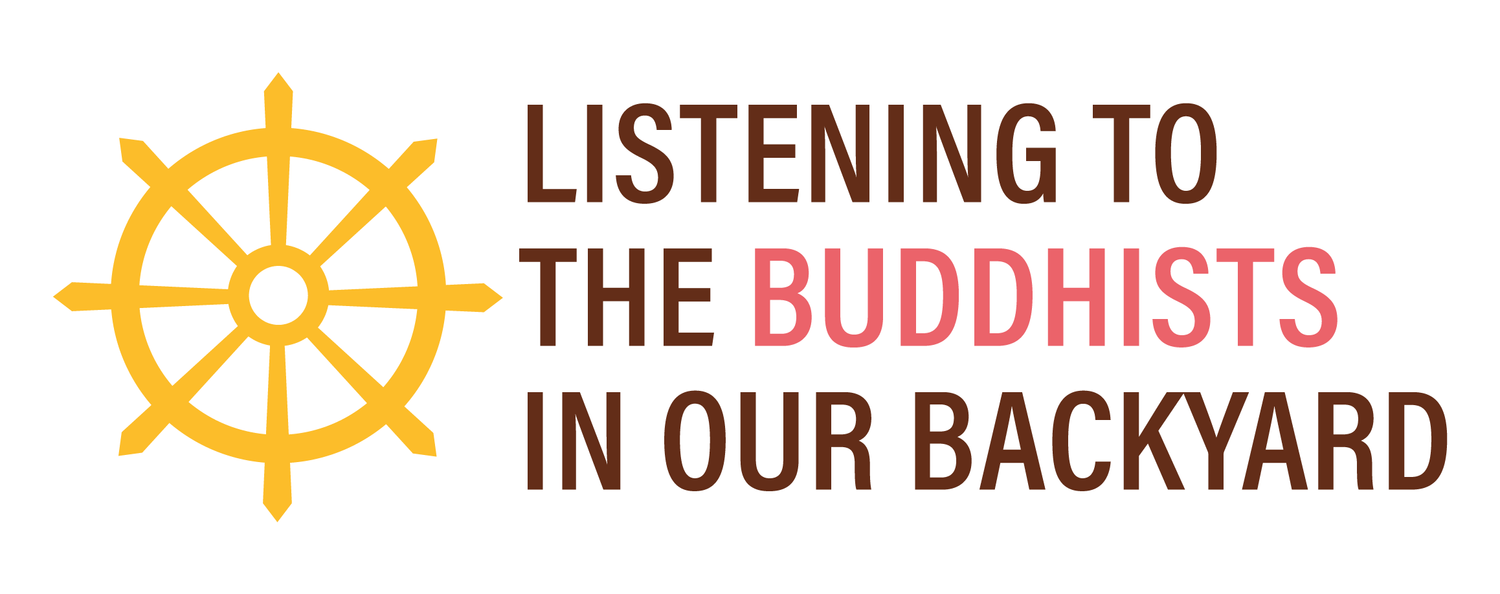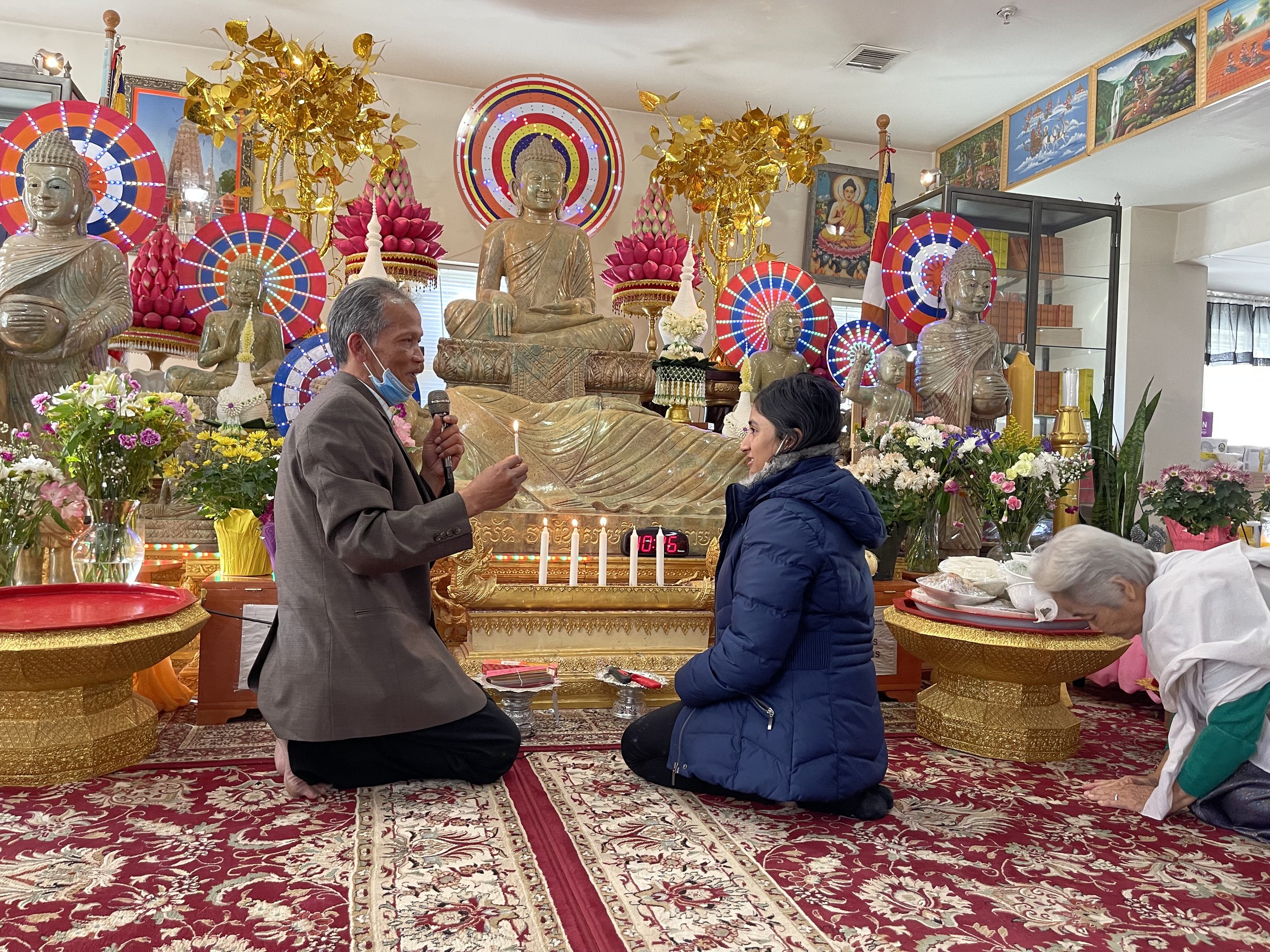The pedagogy of L2BB invites students into different ways of learning, reflecting, and making meaning.
Instead of first encountering Buddhism through textbooks or lectures in a classroom, students visit local Buddhist communities where they learn to ask questions, make observations, and synthesize their reflections.
“Buddhism is sharing yogurt.”
This student reflection might seem odd, even off: What about the Four Noble Truths, the Five Precepts, the Noble Eightfold Path, the vast historical and philosophical differences among Buddhism traditions? Yet this pithy reflection points to a central aim of our pedagogy: to introduce students to the lives and experiences of local Asian American Buddhist communities, and to learn from our encounters with these local Buddhists. Students who received the gift of yogurt at a temple, for example, came to see the deep connections between lay and monastic Buddhists, the role of mutual dana in supporting these communities, and concrete manifestations of Buddhist virtues and values.
With these rich, embodied, sensory experiences as a foundation, student questions and curiosity lead naturally to more conceptual readings about gender, monasticism, generosity, and immigration.
In this approach, people come before theory, experiential knowing before book knowledge. We cultivate a practice of questioning and wondering as we enter new spaces, rather than comparing what we see with theoretical idea(l)s of “who Buddhists are” or “what real Buddhists do.”
BUDDHISM IS WHAT THE PEOPLE IN OUR LOCAL COMMUNITIES ARE DOING:
Gardening / Sharing yogurt / Chanting / Teaching / Supporting community members / Celebrating holiday / educating the next generation in various Buddhist, linguistic, and cultural traditions /
Gardening / Sharing yogurt / Chanting / Teaching / Supporting community members / Celebrating holiday / educating the next generation in various Buddhist, linguistic, and cultural traditions /
Our approach privileges the experiential and everyday by engaging with the lives and concerns of the very people who comprise these communities.
People before theory • Not-knowing before knowing • Questions before answers • Contexts before texts
We sought to reimagine this standard approach to learning…
1 .Read / listen to lecturer
2. Discuss
3. Repeat
4. Write essay for teacher
With this L2BB approach:
Click to enlarge
learn more about our pedagogical approach
-

Articles
Please refer to the co-authored article and book chapter below.
-

Kindred Projects
You’ll also find a list of kindred projects that share our conviction about the transformative potential, for teachers and students alike, of paying careful attention to local Buddhist communities.
-

Resources
We’ve linked to a range of resources that we hope will serve as further inspiration for your reflection and engagement on this path.
Articles
-
Listen and Learn: Equity, Embodied Pedagogies, and Engaging Asian American Buddhists Teachers College Record: The Voice of Scholarship in Education Chenxing Han and Andy Housiaux
“Mirroring the emergent and adaptive methods of L2BB, this article incorporates student voices, narrative interviews, and methodological reflections to advance our claim that an embodied, listening-first model of learning avoids common pitfalls of community-based learning while enabling students to develop a more accurate picture of racial and religious minorities in the United States.” [download PDF version]
-
Listening to the Buddhists in Our Backyard: Recentering the Marginalized, Welcoming the Unknown by Chenxing Han and Andy Housiaux
With the Best of Intentions: Interreligious Missteps and Mistakes
edited by Lucinda Mosher, Elinor Pierce, and Or Rose (Orbis Books)“Nervous and excited, we piled into the Suburban that would serve as our behemoth of a ride for the next week of temple visits and drove the twenty-five minutes to Chua Tuong Van, a Vietnamese Buddhist Temple in Lowell, Massachusetts.” [download PDF version]
Kindred Projects
-
Transnational Buddhism through Digital Mapping
An undergrad course taught by Daigengna Duoer at UC Santa Barbara, sponsored by the Creative Computing Initiative at UCSB (Summer Session B, 2022). Check out the ArcGIS StoryMaps that the students created: American Buddhist Meditation Temple, Bodhi Path Buddhist Centers, and Zen Buddhism in California.
-
Jivaka Project
A repository of pedagogical resources for teaching about global Buddhisms, medical pluralism, and the intersections between religion and health by C. Pierce Salguero (who reflects on the project’s engaged pedagogical approach here) and others. Jivaka Project Philadelphia was the first comprehensive survey of Buddhist healers and healing in any major American city, with undergraduates conducting much of the research, as this article explains.
-
Arkansas Story Vault, Pho Minh Buddhist Temple
An oral history project highlighting religious pluralism in Arkansas, by undergraduate students Michael Fuhrman and Mackenzie Mollner, featuring interviews with Christopher Ha, Dao Ha, Loc Huynh and Ngan Phan, Dominic Mai, Duc Nguyen, Van Nguyen, Julia and Lisa Thai, Kevin Truong, Cam Yeung, and Jason Yeung
Resources
-
2023–2024 Virtual talk series on “Critical Pedagogy in Buddhist Studies,” hosted by Cornell University's Society for Buddhist Studies
-
“A Second Home” newspaper article about Buddhist temples in Wichita, Kansas, by Celia Hack and Hugo Phan
-
“Can We Reimagine School Through a Buddhist Lens?” by Susao Yao in Lion’s Roar magazine
-
AAR Buddhist pedagogy seminar


